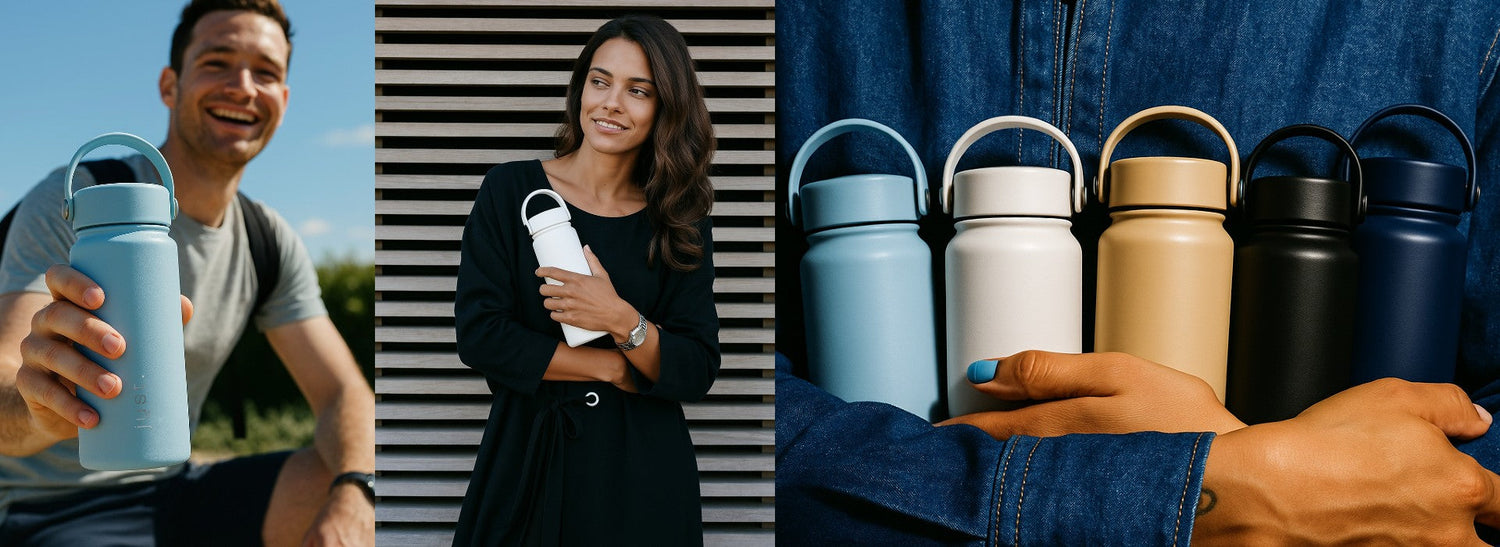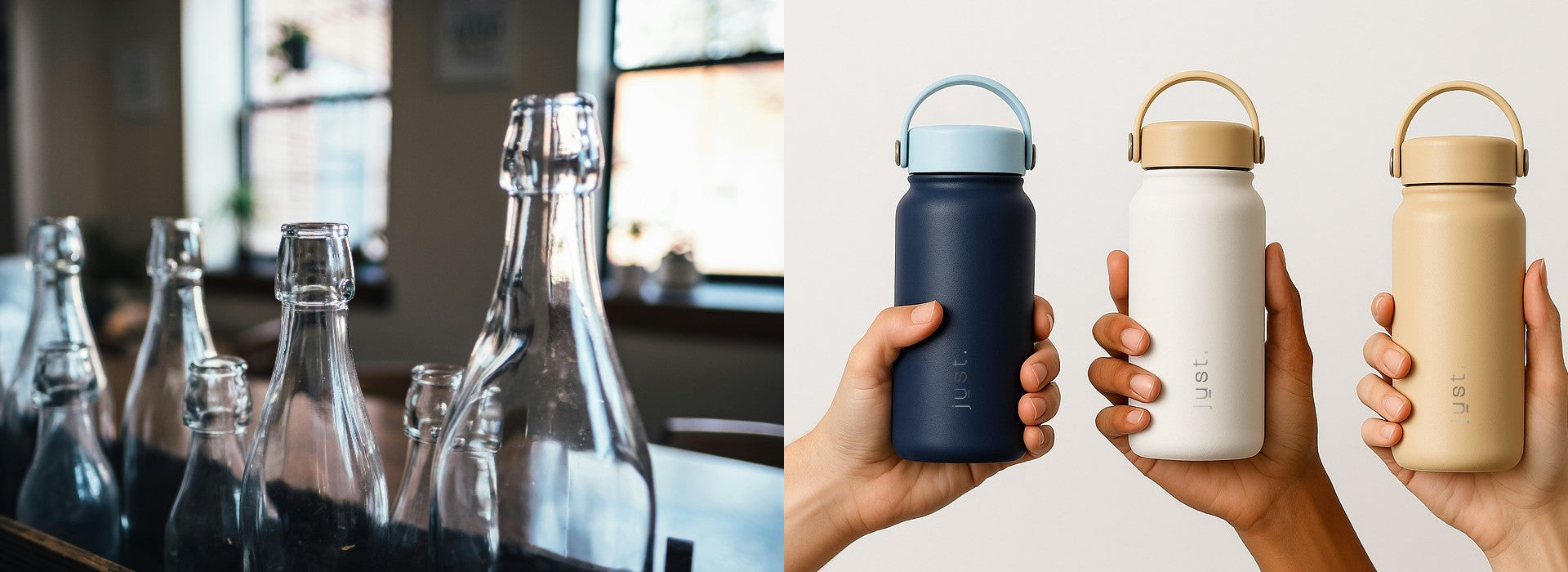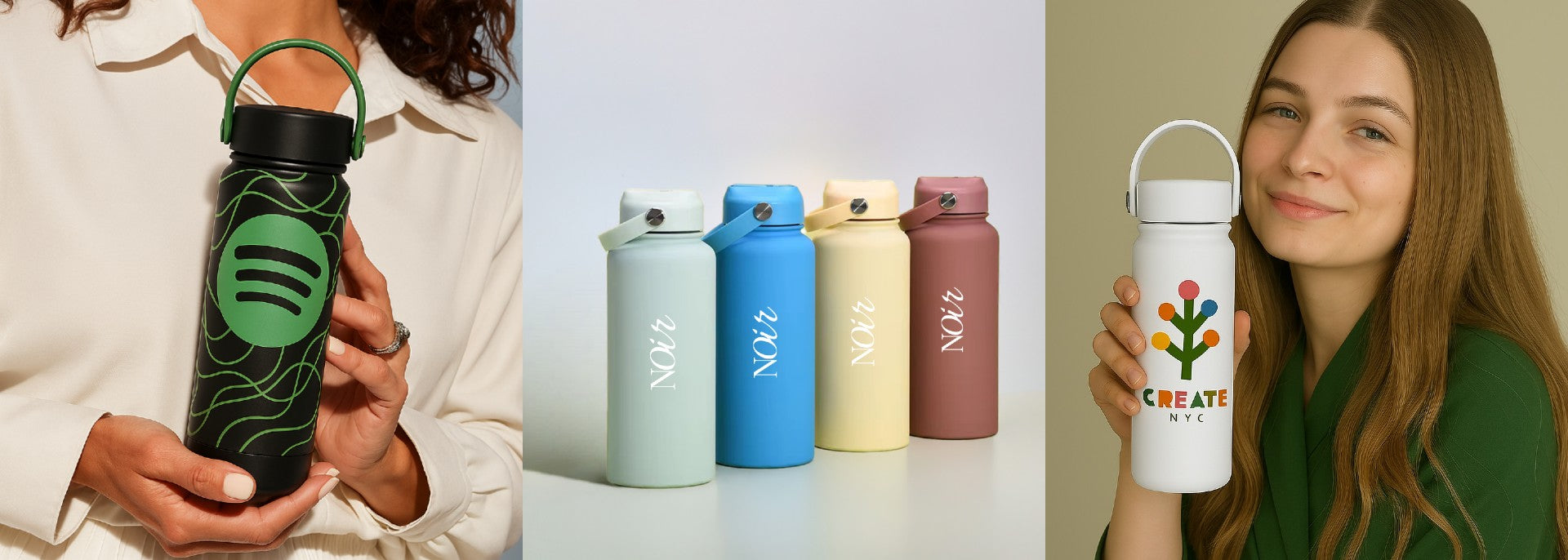When choosing a reusable water bottle, there are a variety of materials to consider. Depending on your needs, the right material can have many benefits, while the wrong one can cause problems.
Lets dive in and take a look at the different types of reusable water bottle materials, their advantages and disadvantages, and their environmental impact.
Quick find
Are metal water bottles good for the environment?
Choosing the right material for your needs
Types of water bottle materials
The most common types of reusable water bottle materials are plastic, stainless steel, glass, and aluminium. All of these materials have their own unique benefits and drawbacks, so let’s take a closer look at each of them.
Quick summary:
- Plastic water bottles are lightweight and affordable, but they can leach chemicals into the water and are not as durable as other materials.
- Stainless steel water bottles are more durable and don’t leach chemicals, but they are slightly heavier and more expensive.
- Glass water bottles are non-toxic and don’t leach chemicals, but they are fragile and can be difficult to transport. Aluminium water bottles are lightweight and durable, but they can leach a metallic taste into the water.
For more in depth details, keep reading..
Stainless steel water bottles advantages and disadvantages
Advantages of stainless steel water bottles
Stainless steel bottles are an ideal choice for those looking for an environmentally-friendly and durable option. Stainless steel water bottles combine the benefits of eco-friendliness and functionality, making them a great material choice, they're extremely sturdy and do not absorb odours or flavours, ensuring that your water retains its original taste and quality.
Stainless steel's exceptional resistance to corrosion ensures that your water bottles will remain in excellent condition, even after prolonged use.
Considering the growing concern over plastic pollution, stainless steel water bottles offer an impactful solution to reduce plastic consumption, especially for companies looking for branded water bottles.
By providing employees, customers, or event attendees with reusable stainless steel bottles, you not only enhance your brand's visibility but also align with environmentally conscious values.
These bottles can serve as a lasting advertisement for your brand, carrying your logo through various settings, from gyms and offices to outdoor adventures.
Durability is a key factor when it comes to reusable water bottles, stainless steel's exceptional resistance to corrosion ensures that your bottle will remain in excellent condition, even after prolonged use. This longevity enhances the value of your investment in a high quality reusable bottle
Ease of transport is another advantage of stainless steel water bottles. They're generally lightweight and designed for convenience, making them an excellent choice for people on the go, just as they are for those looking for an environmentally-friendly and durable option.
Stainless steel water bottles are also a great choice for those looking to reduce their plastic consumption. They are reusable and last for years, making them a great long term investment.
Benefits of using a stainless steel bottle
Keeping drinks cold or hot for longer: Many stainless steel water bottles, such as our Just Bottle Insulated Stainless Steel Water Bottle, are made with insulation, which helps to keep drinks cold or hot for extended periods of time. This can be especially convenient when you are on the go and don't have access to a refrigerator or microwave.
Reducing plastic waste: One of the biggest benefits of using a stainless steel water bottle is that it reduces plastic waste. Single-use plastic bottles are a major contributor to plastic pollution, which has negative impacts on the environment and marine life. By choosing a stainless steel water bottle, such as our Just Bottle Stainless Steel Water Bottle, you can help to reduce this pollution and protect the planet for future generations.
Saving money: A stainless steel water bottle is typically more durable and long-lasting than disposable plastic bottles, which means that you can save money in the long run by not constantly having to replace it.
Convenience: A stainless steel water bottle is often more convenient than a disposable one, with features such as leak-proof caps and an easy-to-carry handle that makes it perfect for everyday use.
Aesthetics: A stainless steel water bottle comes in a wide range of styles and colours, so you can choose one that fits your personal taste and style.
Health benefits: A study by the National Institute of Health showed that using a stainless steel water bottle holds less bacteria and is cleaner overall compared to plastic. A cleaner bottle encourages
People to drink more water and stay hydrated. Proper hydration is important for overall health and wellness, as it can help to regulate body temperature, flush out toxins, and support proper organ function.
Disadvantages of Stainless Steel Water Bottles
On the downside, stainless steel bottles tend to be slightly heavier than plastic or aluminium bottles. Additionally, they are more expensive compared to other materials, but generally considered worth it in the long run.
Plastic water bottles: advantages and disadvantages
Advantages of plastic water bottles
Plastic water bottles have long been a choice for single-use hydration. Their popularity has been attributed to several key advantages: their lightweight and affordable nature, a wide array of shapes, sizes, and colors to choose from, and a level of durability that prevents them from shattering upon impact.
These features have historically made plastic water bottles a convenient choice, especially for outdoor activities where temperature control isn't a concern, given their easy portability and resistance to shattering when dropped compared to glass bottles.
However, it is important to emphasize that the perception of benefits associated with single-use plastic bottles has undergone a significant shift in recent years.
As awareness of environmental concerns has grown, it has become abundantly clear that the convenience of plastic bottles comes at a substantial cost to our planet.
The plastic pollution crisis, overflowing landfills, and devastating harm to wildlife have made it increasingly evident that the convenience of single-use plastic is no longer justifiable.
The once-perceived benefits of plastic bottles have been overshadowed by the pressing need to transition towards more sustainable alternatives. It is imperative that we recognize the true environmental cost of single-use plastics and prioritize eco-friendly choices for a healthier planet.
Disadvantages of plastic water bottles
Plastic water bottles are prone to leaching chemicals if they come into contact with certain liquids or temperatures, and they can be difficult to clean.
Additionally, plastic bottles tend to absorb odours, making them unpleasant to use after a couple of uses. Finally, because plastic is not as durable as other materials, plastic bottles may need to be replaced more frequently than other types.
The main drawback is that plastic water bottles are not as environmentally friendly as other types of water bottles. They are made from petroleum-based products, which are not biodegradable and can take hundreds of years to decompose.
Plastic has been proven to break down into thousands of tiny pieces of "micro plastics," which then easily make their way into the drainage system and eventually into the ocean.
This has a devastating effect on marine life and ocean pollution. Additionally, the production of plastic water bottles requires a large amount of energy and resources, making them a less sustainable option than other types of water bottles.
Plastic water bottles are also not made with any insulating properties so they can't keep drinks hot or cold for very long.
Plastic vs stainless steel water bottles
Chemical leaching: Some cheap plastic bottles contain BPA. According to the Environmental Working Group (EWG), "BPA is an industrial chemical that has been used to make certain plastics and resins since the 1960s.
Its widespread use has raised concerns because it is an endocrine disruptor, which means it can interfere with the body's hormone system and cause harmful health effects. BPA can seep into food or beverages from containers that are made with it.
The U.S. Food and Drug Administration (FDA) has said that BPA is safe at the low levels that occur in some foods, but several studies have suggested otherwise."
According to the National Institutes of Health (NIH), "BPA is a synthetic estrogen that has been linked to a wide range of negative health effects, including cancer, cardiovascular disease, and reproductive problems.
While some water bottles are now marketed as BPA-free, there are concerns about other chemicals that may be present in plastic bottles and the potential long-term impacts on human health."
Durability and safety: According to the International Association for Plastics Distribution (IAPD), "Stainless steel is extremely durable and long-lasting, making it a popular choice for water bottles and other containers.
It is also resistant to corrosion, which means that it will not rust or degrade over time. In addition, stainless steel is a safer material for food and beverage containers, as it does not contain chemicals that can leach into your water or other substances. This makes it a healthier and more hygienic option compared to some types of plastic."
Environmental impacts: According to the United States Environmental Protection Agency (EPA), "The production of plastic requires large amounts of fossil fuels, which contribute to climate change and other environmental problems.
In addition, plastic waste can have negative impacts on wildlife and the environment, as it can take hundreds of years to break down and decompose. In contrast, stainless steel is a more sustainable material, as it is 100% recyclable and requires fewer resources to produce. Using stainless steel products can help to reduce your carbon footprint and contribute to a more sustainable future."
Glass water bottles: advantages and disadvantages
Advantages of glass water bottles
Glass bottles can be a great choice for those looking for an eco-friendly and stylish option. They have a sleek design and are easy to clean. Glass bottles also do not absorb odours or flavours, and they can provide insulation if they are double-walled.
Glass bottles are also a great choice for those looking to reduce their plastic consumption. They are reusable and can last for years if taken care of properly. Additionally, glass bottles are non-toxic and do not contain any chemicals that can leach into your water. This makes them a safe and healthy choice for drinking water.
Disadvantages of glass water bottles
Glass bottles tend to be more fragile than other materials and are prone to shattering if dropped. Glass can be heavier than other materials and may not fit in a standard cup holder. Glass bottles tend to be more expensive than other materials like plastic.
In addition, glass bottles can be difficult to clean due to their narrow necks and can be difficult to reach with a sponge or brush.
Aluminum water bottles: advantages and disadvantages
Advantages of aluminium water bottles
If you’re looking for a cheap option that's not plastic, aluminium bottles are a another choice. They provide some insulation and come in a variety of sizes and styles. Additionally, aluminium bottles are durable and resistant to corrosion.
Disadvantages of aluminium water bottles
The main downside to aluminium bottles is for health reasons. Aluminium is toxic for humans, and it leaches into the drink inside.
To combat this, most aluminium bottles are made with a thin plastic lining on the inside layer to protect from the toxic aluminium, however, this thin plastic layer can easily break down with time, which leads to drinking small bits of plastic followed by the toxic aluminium coming into contact with the drink inside.
Aluminium bottles also tend to absorb odours and flavours, which can make them unpleasant to use over a longer time period.
Additionally, they can be difficult to clean and scratch more easily compared to stainless steel. Finally, some aluminium bottles contain BPA, a chemical that can be harmful if ingested.
Further reading: Are Aluminum Water Bottles Safe?
Aluminium Bottle vs Stainless Steel
When weighing up the choice between aluminum and stainless steel for your reusable bottle, it's crucial to consider the unique advantages and drawbacks of each material.
Aluminum bottles are slightly lighter and more affordable compared to stainless steel, making them a convenient choice for on-the-go hydration.
However, as mentioned before, because aluminium is not a food grade material and is unhealthy to drink from, it requires a thin plastic lining on the interior of the water bottle to prevent the aluminum from reacting with the liquids inside.
Over time, this plastic layer can degrade, leading to flavor transfer and potential health concerns.
In stark contrast, stainless steel bottles are the most popular choice due to their non-reactive nature. Unlike aluminum, stainless steel won't interact chemically with the beverages it contains which means it does not require a plastic lining on the interior.
This ensures that your drinks remain fresh and untainted by any metallic taste or harmful compounds for the life of the bottle.
Furthermore, stainless steel's durability and resistance to corrosion make it a long-term investment that not only provides a durable drinking experience but also contributes to a sustainable lifestyle.
So, when making your decision, consider the benefit of stainless steel's non-reactive quality as a better long term investment, ensuring your drinks stay fresh and uncontaminated sip after sip. Of course this needs to be balanced against the slightly higher initial cost of stainless steel bottles vs aluminium.Pros and Cons of Reusable Water Bottle Materials
Ultimately, the right material for your reusable water bottle will depend on your needs and preferences. Plastic bottles are lightweight, affordable, and come in many shapes and sizes.
Stainless steel is highly durable and does not absorb odours or flavours and is the most environmentally friendly, but is more expensive than plastic. Glass is eco friendly but fragile. Aluminium is lightweight and affordable but prone to absorbing toxic chemicals.
Are Metal Water Bottles Good for the Environment?
Yes! Metal water bottles are among the most environmentally friendly options, particularly when they’re made from high-quality stainless steel.
Metal bottles are designed for longevity and repeated use, which significantly reduces reliance on single-use plastic bottles, a major contributor to pollution and ocean waste.
Over their lifetime, metal bottles can replace hundreds (or even thousands) of disposable bottles, helping individuals and businesses dramatically cut down on plastic consumption.
That said, not all metal bottles are equally eco-friendly. While both stainless steel and aluminium are recyclable, stainless steel has key advantages when it comes to environmental impact.
As discussed earlier, it doesn’t require a plastic lining, it’s more durable, and its long lifespan offsets the energy used during production. By contrast, aluminium bottles often rely on plastic linings that degrade over time and complicate recycling, reducing their overall sustainability.
To make a truly eco-conscious choice, it’s important to compare each material not just by its recyclability, but also by its durability, energy use, and long-term performance.
Environmental comparison of water bottle materials
| Material | Recyclability | Production Energy | Longevity | Pollution Risk |
|---|---|---|---|---|
| Stainless Steel | 100% recyclable | High (initial) | Very long | Low |
| Plastic (rPET) | Recyclable if rPET | Low | Shorter | High (microplastics) |
| Glass | Recyclable | Moderate | Long (if unbroken) | Low |
| Aluminium | Recyclable | Very high | Moderate | Medium (toxic + lining) |
Choosing the right material for your needs
Not all reusable bottles are created equal - the right choice depends on your lifestyle, values, and how you plan to use it day to day. Here's a quick summary of how to choose the best material based on your needs:
For Durability and Temperature Control: Choose Stainless Steel
If you need a bottle that can handle knocks, drops, and daily commuting — stainless steel is your best option. It’s built to last, resistant to dents and corrosion, and ideal for both indoor and outdoor use. Double-wall insulation keeps drinks cold for 24 hours or hot for 12, making it the top choice for people on the go, in the office, or hitting the gym. While it comes with a higher upfront cost, the longevity and performance make it well worth the investment.
For a Minimal Look: Choose Glass
If you prefer a clean, elegant design and want to avoid any risk of chemical leaching (compared to aluminium and plastic), glass is a great option. It’s taste-neutral, easy to clean, and perfect for low-impact environments like home or office desks. However, glass is fragile and non-insulated, so it’s less suited for travel or outdoor use. Look for bottles with a protective silicone sleeve for added safety.
For Occasional or Lightweight Use: Use BPA-Free rPET Plastic
Plastic bottles are lightweight, portable, and inexpensive - but traditional plastics are unsustainable and often contain chemicals that can leach over time. If you choose plastic, make sure it’s made from 100% recycled PET (rPET) and clearly marked BPA-free. These are better for the environment and safer for everyday use, but they’re still less durable and less heat-resistant than stainless steel or glass.
Avoid Aluminium for Daily Use
While aluminium bottles may look appealing due to their light weight and cheap price tag, they’re not a safe or sustainable choice for reusable hydration. Most require a plastic lining to prevent metal leaching, which can wear down with use and potentially release chemicals into your drink. Aluminium also offers poor insulation and dents easily, making it a less reliable option overall.
Overall benefits of reusable water bottles
Reusable water bottles reduce the risk of health problems that come from drinking contaminated or chemically enhanced water, especially from plastic.
Economically speaking, reusable water bottles cost more at first but will save you a lot of money in the long run, taking into account the cost of using disposable bottles every day.
Environmentally speaking, avoiding single-use bottles will significantly reduce your carbon footprint and the amount of plastic that is consumed in the manufacturing process.
FAQ's
What is the safest and most durable material for a reusable water bottle?
Stainless steel is the safest and most durable option. It’s naturally non-toxic, doesn’t leach chemicals, and offers excellent insulation. It’s also resistant to corrosion, making it ideal for long-term daily use.
Are plastic water bottles okay to use if they’re BPA-free?
Yes - if you're choosing plastic, always ensure it's clearly labeled BPA-free. Bottles that aren’t BPA-free can leach harmful chemicals into your drink, especially when exposed to heat or over time. BPA is a known endocrine disruptor and has been linked to a range of health concerns, so avoiding it is essential.
That said, even BPA-free plastic isn’t the most sustainable choice. Most are still made from new plastic, contributing to pollution and fossil fuel consumption. If you need to use plastic, look for bottles made from 100% recycled PET (rPET) - a far better alternative that uses plastic already in circulation, reducing environmental impact and keeping waste out of landfills and oceans.
While BPA-free rPET is a safer and more eco-friendly option, stainless steel and glass still offer superior durability, temperature control, and long-term sustainability.
Why are aluminium bottles not recommended for daily use?
Aluminium bottles often require a plastic lining to prevent toxic metal from leaching into drinks. Over time, this lining can degrade, leading to health risks and unpleasant metallic tastes. Aluminium also lacks durability and insulation.
What material should I choose based on my lifestyle?
Choose stainless steel for durability and temperature control, glass for a minimal, clean-tasting option at your desk, and BPA-free rPET plastic for lightweight, occasional use. Avoid aluminium for health and performance reasons.







